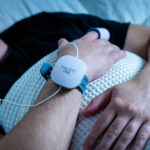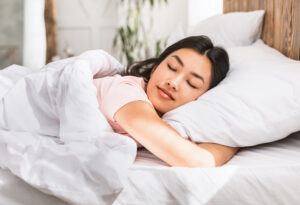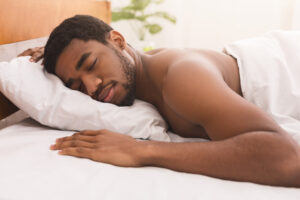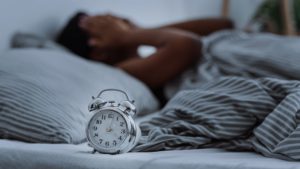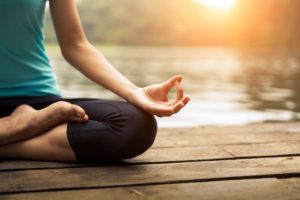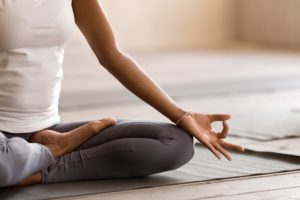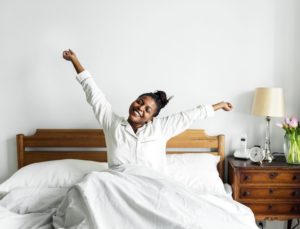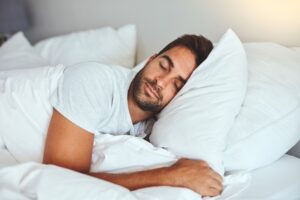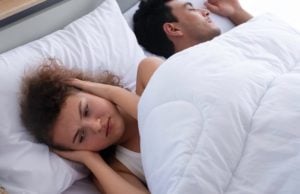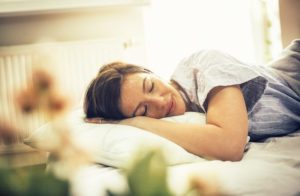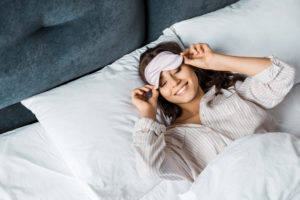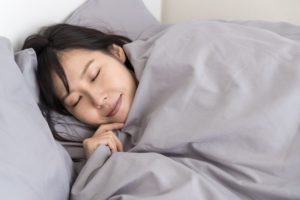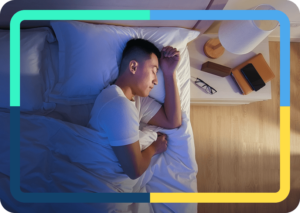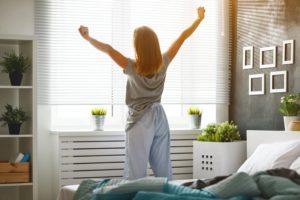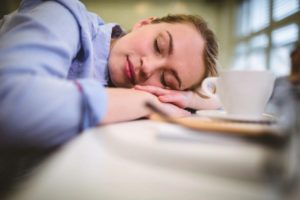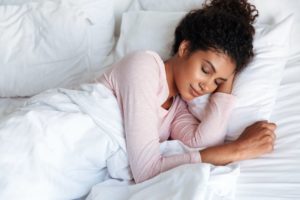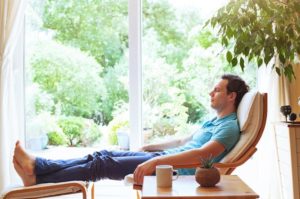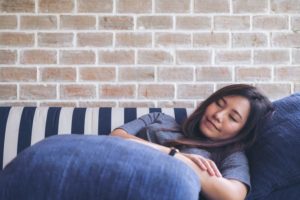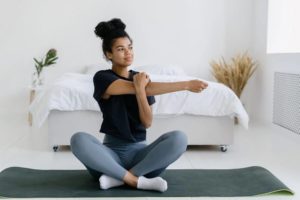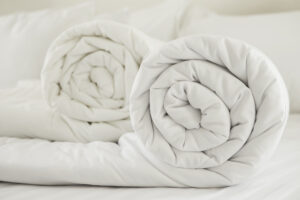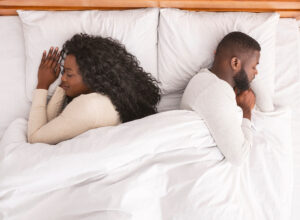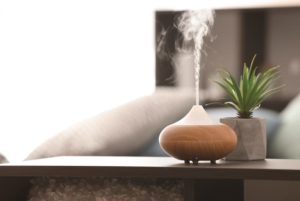When you buy through our links, we may earn a commission. Products or services may be offered by an affiliated entity. Learn more.
How to Fix Your Sleep Schedule
- A regular sleep routine is essential for good sleep quality and maintaining your body’s internal clock.
- Make gradual, consistent adjustments to your sleep routine and align your schedule as closely with day and night as you can.
- Supplemental melatonin and light therapy can help naturally adjust your circadian rhythm and reset your sleep drive.
For optimal mental and physical health, adults need at least seven hours of sleep , and it is important to get this amount of rest on a regular basis.
One of the best ways to promote consistent sleep is by following a healthy sleep routine. When practicing good sleep hygiene, the mind and body become accustomed to a routine that includes plenty of high-quality sleep. Unfortunately, many factors can disrupt a sleep routine. When this happens, bedtimes and wake-up times can fluctuate wildly, and a person may alternate between nights of too much and too little sleep. Learning techniques for resetting your sleep routine offers a way to resolve this type of sleep inconsistency and optimizes rest for the body and mind.
Struggling to Stay Awake? Take an At-Home Sleep Test
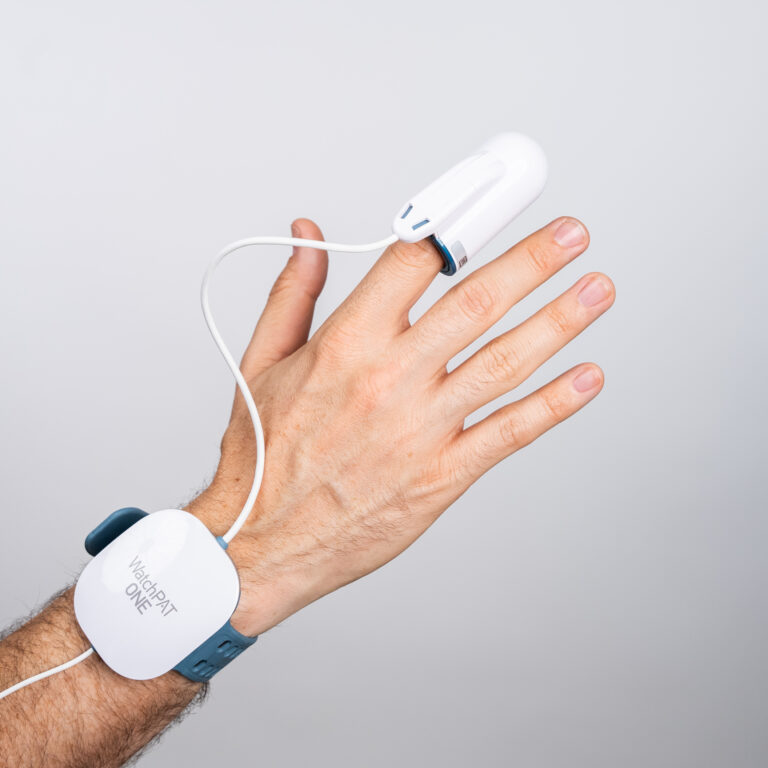
our partner at sleepdoctor.com
10% off Home Sleep Tests
Buy Now“Truly grateful for this home sleep test. Fair pricing and improved my sleep!”
Dawn G. – Verified Tester
Why Is a Sleep Routine Important?
Humans are often described as creatures of habit because we are inclined to become conditioned to distinct patterns of behavior through repetition of certain cues and responses. Routines can make actions nearly automatic in numerous aspects of daily life, including sleep. Actively cultivating a healthy sleep routine makes it easier to get the sleep you need on a consistent basis. By creating habits and cues that promote sleep, it becomes easier to fall asleep quickly and stay asleep through the night. With more repetition, the routine gets reinforced, facilitating increasingly stable sleep patterns over time.
What Role Does Circadian Rhythm Play in a Sleep Routine?
The body’s internal clock is the principal driver of circadian rhythms, including the 24-hour sleep-wake cycle. This circadian rhythm is crucial to managing the delicate balance between sleep and wakefulness , helping us be alert or drowsy at the appropriate times and establish a healthy sleep routine.
Light exposure is an essential influence on circadian rhythm , which is closely aligned with the day-night cycle. When the eyes are exposed to light, the brain sends signals associated with wakefulness. When light exposure decreases at night, the signals switch to promote relaxation and sleep.This helps synchronize the internal clock with the external environment. Research demonstrates that well-synchronized circadian rhythms can contribute not only to healthy sleep but also to numerous other aspects of well-being , including mental health and metabolism.
How Can a Sleep Routine Get Thrown Off?
There are multiple ways for sleep routines and circadian rhythms to get thrown off-kilter.
- Jet lag: Associated with rapid travel across multiple time zones, jet lag occurs when the body’s internal clock is not in sync with the day-night cycle of the travel destination.
- Shift work: People who work night shifts are required to be awake through the night and sleep when the sun is out, disrupting normal circadian synchronization.
- Advanced or delayed sleep timing: Some people are extreme early birds or night owls, meaning that their sleep timing, also known as their sleep phase, is shifted forward or back by several hours. This can be seen in delayed sleep-wake syndrome.
- Artificial light exposure: Biologically, the circadian rhythm developed to correspond with sunlight long before electricity was invented. However, the brain responds to artificial light as well, which means that constant exposure to indoor lighting as well as blue light emanating from electronic devices like cell phones, tablets, televisions, and computers can interfere with typical signals that convey whether it is day or night.
- Fluctuating sleep hours: Many people have no set bedtime or wake-up time. Their sleep schedule can change dramatically from one day to the next or between weekdays and weekends, which prevents establishing a steady sleep pattern.
- Behavior patterns: Deciding to stay up late or wake up early to study, play sports, or take part in social activities can throw off normal sleep routines.
- Caffeine and energy drinks: Stimulants may help people feel alert, but they can upset the body’s ability to naturally alternate between sleep and wakefulness, making it more difficult to fall and stay asleep.
- Stress and emotional difficulties: Many sleeping problems are tied to stress, anxiety, depression, and other emotional or mental health problems. These conditions can cause the mind to race when trying to fall asleep or cause sleepiness during the day, preventing the development of a consistent and healthy sleep routine.
How Can You Adjust Your Sleep Routine?
Start adjusting your sleep routine by making consistency a priority. Habits and routines are powerful, precisely because they are repeated over and over again in order to create a pattern.
A key first step is to reset your sleep schedule. Pick a bedtime and wake-up time that you can stick with and that offer ample time for the sleep you need. Follow this schedule every day, even on weekends. It may take time to adjust to this new sleep schedule, which is normal.
To gradually adopt a new sleep schedule, you can make adjustments in 15 or 30 minute increments over a series of days. You can also focus first on the wake-up time, creating one fixed part of your schedule, and then use good sleep hygiene habits to incrementally get used to falling asleep at your desired bedtime.
What Is the Ideal Time to Go to Bed and Wake Up?
There is no single ideal time for going to bed and waking up that is best for everyone. In general, in order to synchronize your circadian rhythm, it is recommended to wake up around the start of daylight hours and wind down and get ready for bed when it gets dark in the evening.
However, daylight hours can vary significantly based on geographic location and season, and for many people, it can be impractical to follow a sleep schedule that strictly mirrors the day-night cycle. For that reason, the general principles to follow are that your bedtime and wake-up time should:
- Stay consistent from day-to-day
- Allow for at least seven hours of sleep each night
- Align as closely with day and night as your lifestyle allows
Tips to Fix Your Sleep Schedule
There are multiple elements that comprise a healthy sleep routine. Setting a consistent sleep schedule is a good foundation, but other steps can help you achieve the sleep you need.
Sleep hygiene plays an essential role in the effectiveness of your sleep routine. One fundamental part of sleep hygiene is ensuring that your daily habits and sleep environment are conducive to sleep.
- Be mindful of light: Exposure to natural light in the morning can promote better synchronization of your internal clock, while keeping your lights on long into the evening can prevent your body from properly transitioning toward sleep.
- Cut down on evening screen time: Smartphones and other devices are sources of excess mental stimulation and emit blue light that can affect circadian timing. To avoid the negative effects of screen time on sleep, try not to use your phone, tablet, or laptop for at least an hour before bed.
- Commit to physical activity: Regular exercise is good not only for your cardiovascular health, it also promotes healthy sleep. Even mild physical activity like going for a walk can be beneficial, and is a great opportunity to get daylight exposure. If opting for high-impact exercise, aim to finish workouts a couple hours before bed.
- Have a bedtime routine: Try to follow the same steps each night before going to bed, such as dimming the lights, quietly reading or stretching, putting on pajamas, and brushing your teeth. Over time, those actions become cues that tell your body that it is time for sleep. To promote mental tranquility, incorporate relaxation methods such as meditation, yoga, listening to soothing music, or reading.
- Be careful with naps: While naps can be restorative in some cases, they can also disrupt your sleep routine. As a general rule, try to keep naps under 30 minutes and only early in the afternoon to prevent nighttime sleep disruptions.
- Limit alcohol and caffeine: Both alcohol and caffeine can be detrimental to a healthy sleep routine. Alcohol makes you sleepy but affects your sleep cycle, making you prone to awakenings and lower-quality sleep as the night goes on. Caffeine makes you wired and alert and can linger in your system, leading to restlessness at bedtime. It can be helpful to eliminate or reduce consumption of alcohol and caffeine, especially in the late afternoon and evening.
- Cultivate an inviting sleep environment: A dark and quiet bedroom is best for promoting restful sleep. A cool yet comfortable temperature and soothing smells, like lavender, may promote relaxation and provide cues for sleep. You can also make your bedroom a haven for rest with a comfortable mattress, pillow, and bedding.
“Most of the time when people can’t sleep, they look towards an over-the-counter supplement or medication to fix the problem. However, for most people small changes to one’s sleep routine and habits will be the most effective way to get a better night’s rest.”
Dr. Dustin Cotliar, Sleep Physician
Can Medical Treatments Fix a Sleep Schedule?
If you have significant sleeping problems, talk with your doctor about the best way to reset your sleep routine. Depending on the causes of your sleep difficulties, a doctor may recommend therapies to adjust your sleep routine.
- Melatonin: This hormone is made naturally by the body when darkness falls, and helps stabilize circadian rhythm and promote sleep. For some sleep conditions, melatonin supplements can help kickstart a new sleep pattern.
- Light therapy: This treatment involves sitting in front of a high-powered lamp for a short period of time, usually in the morning. The high dose of light is designed to help correct for a misaligned circadian rhythm.
- Cognitive behavioral therapy for insomnia (CBT-I): This type of therapy works to identify and reorient negative thoughts and behaviors about sleep, while structuring a plan for a healthier sleep routine.
Does Pulling an All-Nighter Help Reset Your Sleep Routine?
Pulling an all-nighter does not help develop a better sleep routine. Without sleeping, you are likely to suffer from impaired thinking and concentration the next day, putting you at risk of accidents.
In addition, your sleep will likely become irregular after a period of sleep deprivation. For example, your sleep stages may be off-kilter because of a REM sleep rebound , which means you spend more time in the rapid eye movement sleep stage.
Resetting your sleep routine will likely take time. Making gradual changes can make it easier to adjust to a new schedule.

Still have questions? Ask our community!
Join our Sleep Care Community — a trusted hub of sleep health professionals, product specialists, and people just like you. Whether you need expert sleep advice for your insomnia or you’re searching for the perfect mattress, we’ve got you covered. Get personalized guidance from the experts who know sleep best.
References
8 Sources
-
Consensus Conference Panel, Watson, N. F., Badr, M. S., Belenky, G., Bliwise, D. L., Buxton, O. M., Buysse, D., Dinges, D. F., Gangwisch, J., Grandner, M. A., Kushida, C., Malhotra, R. K., Martin, J. L., Patel, S. R., Quan, S. F., Tasali, E., Non-Participating Observers, Twery, M., Croft, J. B., Maher, E., … Heald, J. L. (2015). Recommended amount of sleep for a healthy adult: A joint consensus statement of the American Academy of Sleep Medicine and Sleep Research Society. Journal of Clinical Sleep Medicine, 11(6), 591–592.
https://pubmed.ncbi.nlm.nih.gov/25979105/ -
Wood, W., & Rünger, D. (2016). Psychology of Habit. Annual review of psychology, 67, 289–314.
https://www.annualreviews.org/doi/10.1146/annurev-psych-122414-033417 -
Mendelsohn, A. I. (2019). Creatures of habit: The neuroscience of habit and purposeful behavior. Biological Psychiatry, 85(11), e49–e51.
https://pubmed.ncbi.nlm.nih.gov/31122343/ -
Division of Sleep Medicine at Harvard Medical School. (2007, December 18). The Drive to Sleep and Our Internal Clock | Healthy Sleep., Retrieved December 1, 2022, from
http://healthysleep.med.harvard.edu/healthy/science/how/internal-clock -
National Institute of Neurological Disorders and Stroke (NINDS). (2019, August 13). Brain basics: Understanding sleep., Retrieved December 1, 2022, from
https://www.ninds.nih.gov/Disorders/patient-caregiver-education/understanding-sleep -
Jagannath, A., Taylor, L., Wakaf, Z., Vasudevan, S. R., & Foster, R. G. (2017). The genetics of circadian rhythms, sleep and health. Human molecular genetics, 26(R2), R128–R138.
https://pubmed.ncbi.nlm.nih.gov/28977444/ -
Wright, K. P., Jr, McHill, A. W., Birks, B. R., Griffin, B. R., Rusterholz, T., & Chinoy, E. D. (2013). Entrainment of the human circadian clock to the natural light-dark cycle. Current Biology, 23(16), 1554–1558.
https://pubmed.ncbi.nlm.nih.gov/23910656/ -
Feriante, J., Singh, S. (2020, July 19). REM Rebound Effect. In StatPearls. StatPearls Publishing., Retrieved December 1, 2022, from
https://www.ncbi.nlm.nih.gov/books/NBK560713/



